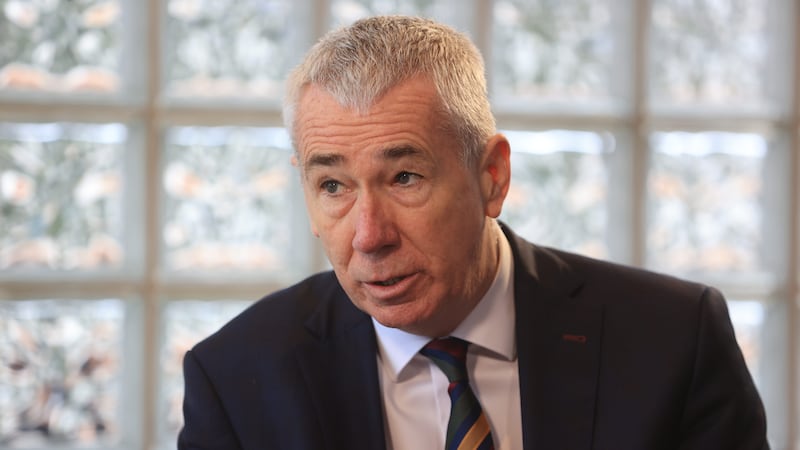The election for the assembly is over but already before the new assembly met, the parties were in disagreement and the DUP refused to create a new executive. Deadlock has continued. It is worth reminding everyone that the UK government recently changed the law regarding elections to the assembly. Previously there was a three-week period for parties in the assembly to form an executive. If no executive could be formed within the three weeks, a new election would occur. The UK government changed the law so that parties now have 24 weeks, or in other words, nearly half a year, to form an executive.
Is the UK government mad? There is a phenomenon called Parkinson’s law, which says that a task will take as much time as is allowed for it. There is nothing like a deadline to focus the mind and stir people to action. Previously, parties in the assembly would have to get on with negotiations within a three-week period. Now, they will be able to shilly-shally and dawdle for half a year. They will be able to fit in a decent summer holiday in the 24-week period.
If a political deadlock continues for months, the reason why it occurs can be traced back to a change in the law that allows a deadlock to continue. New elections after three weeks was a better threat to ending deadlock. I have no doubt that the deadlock will continue for far longer than three weeks. This is a repeated pattern from the UK government. From 2002 until 2007, there was no executive, but the assembly remained in place and the MLAs continued to be paid despite doing nothing.
After the collapse of the executive in 2017, the law which stipulated a three-week negotiation period was ignored and the parties were allowed to continue to stand their ground for three years until an agreement was reached in 2020.
Now, things are in deadlock again but instead of concentrating minds and having a deadline hanging over their heads to get people to act, the UK government has allowed more time than is necessary for parties in the assembly to act.
Giving parties lots of time to do nothing does not work. Will the UK government ever learn this?
SEANÁN Ó COISTÍN
Trier, Deutschland
Northern Ireland is Britain’s Crimea
Northern Ireland is Britain’s Crimea – both were annexed (a nice term for stolen) by an aggressive bullying neighbour.
I ask Britain: who is arming and training the Ukraine military to help them kill Russian soldiers and force them back to Russia? What would Britain’s reaction be if the Dublin government were offered a large amount of tanks, helicopters, drones and lethal military hardware and training – by say China – to help them get independence from British rule of the British-occupied six counties and either kill or push them out leaving a reunited 32-county, four-province sovereign country?
Britain has already 100 years ago extracted themselves out of 26 Irish counties.
Currently we are part of the UK as a result of the 1801 Act of Union which is now invalidated as it does not have cross-community consent, as is today demanded by the Tories and unionists and cited as a reason for there invalidating the protocol. A war, assisted by a more powerful militarised nation, would get Ireland’s six northern counties out of the UK.
One hundred wars would not get Northern Ireland out of the island of Ireland. As I do not support war let the dialogue begin.
My idea of heaven would be to wake up one morning and the protocol and act of union were gone. At that point all that is required is for all Northern Ireland’s citizens to wave goodbye to Brandon Lewis and we concentrate on ruling ourselves. Seems fair to me.
A final question for the British: would they accept Ireland attacking and invading Britain and, as they expect the Irish to do, live with there British invader in peace and harmony? Would they do likewise with their Irish invader, or fight to rid there country of them?
PETER McEVOY
Banbridge, Co Down
Concern over A1 scheme funding
Now that the assembly elections are over, it is essential that the Northern Ireland Executive is reinstated as soon as possible to agree funding of important road improvement projects like the A1 Junctions Phase 2 Scheme.
Road safety has been a serious concern on the A1 for some time and this scheme includes measures such as closing the central gaps and installing a continuous central safety barrier.
The new incoming infrastructure minister must get a grip on this issue. There must be no more excuses and no more delays in the delivery of this project.
I am also worried that any delay in the formation of a new executive will have a negative impact on key departmental funding and budgetary decisions, like this project.
The users of the A1 demand better and road safety improvements, such as these, should be prioritised.
Cllr BRIAN POPE
Alliance Party Group Leader,
Armagh City, Banbridge and
Craigavon Borough Council
Time to get the youth involved
At a recent church gathering, organised by the priests of the Colin-Derriaghy Pastoral Community, in preparation for the forthcoming Synod in Rome, one area of concern emerging was the reluctance of young adults to attend the Sunday liturgy. This view was expressed by committed parents who always attend Sunday Mass. Some vibrant parishes organise faith-based activities for the youth of secondary age on a monthly basis, at which as many as 30 young people attend. It would be a refreshing change if, once in a while, even quarterly, these youth groups [teenagers] could organise the Sunday liturgy and to do all the tasks not required by the ordained ministry. For example, some could welcome parishioners, while others could manage the readings, the prayers of the faithful, the music, help give communion, do the collections inside and outside, serve etc. The primary schools do a marvellous job with the sacramental liturgies of reconciliation and First Communion. It is rare to see the youth involved at secondary age level.
MJ LOMBARD
Lambeg, Co Antrim







